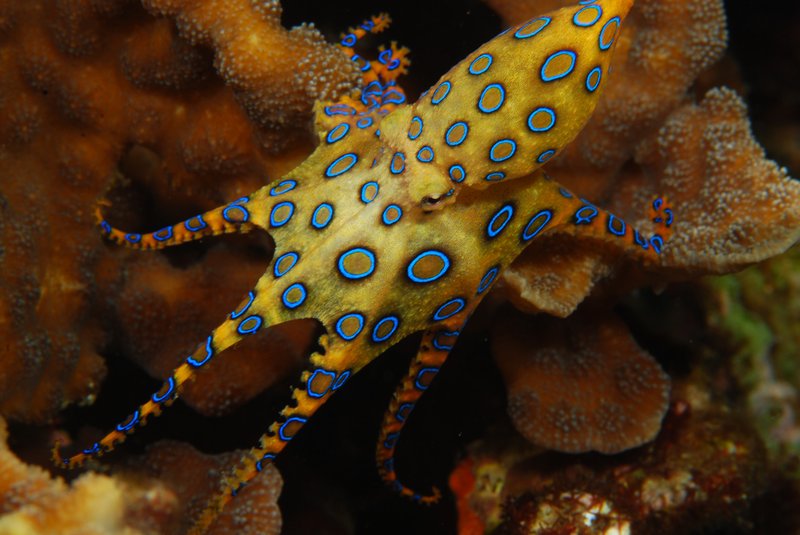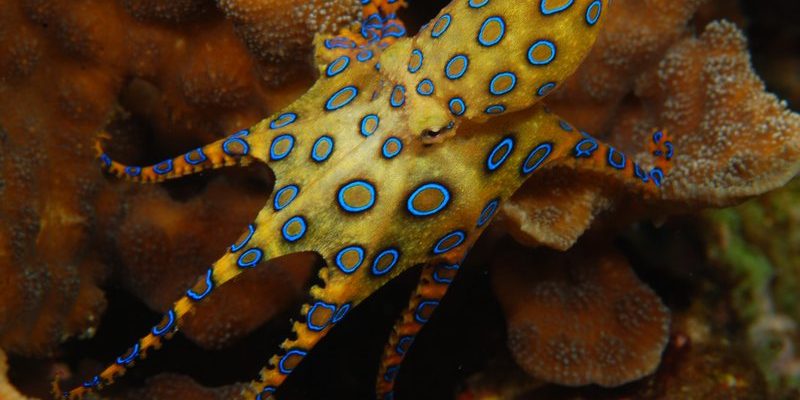
The blue-ringed octopus is not just another fascinating sea animal; it’s a symbol of the delicate balance we maintain in our oceans. These small, usually palm-sized creatures inhabit tide pools and coral reefs in the Pacific and Indian Oceans, and their numbers are starting to raise some eyebrows. So, are they on the brink of disappearing altogether? To answer that, we’ll explore their habitat, threats they face, and the steps being taken to protect them.
Understanding Blue-Ringed Octopuses
Blue-ringed octopuses belong to the genus *Hapalochlaena*, and there are four recognized species. Each of these species showcases vivid blue rings that appear when they feel threatened. Think of it as nature’s warning sign. Despite their pint-sized bodies, they possess enough venom to be lethal to humans. That’s why, even though they’re among the smallest octopuses, they command a significant amount of respect.
One of the fascinating aspects of these creatures is their intelligence. They can change color and texture, blending in with their surroundings like a chameleon. This ability helps them evade predators and capture prey. They primarily feed on crabs and small fish, using their beak-like mouths to crack open shells. This remarkable adaptability in hunting and evasion is one of the reasons they’re often highlighted in discussions about marine biodiversity.
The Habitat of the Blue-Ringed Octopus
You might be surprised to learn that blue-ringed octopuses thrive in some very specific environments. They are typically found in shallow waters, such as coral reefs and tide pools, where they can easily hide among rocks and crevices. These habitats are crucial not just for their survival, but also for the health of the marine ecosystems they inhabit. When you think about it, every creature plays its role in the larger web of life.
Unfortunately, these habitats are under threat. Coastal development, pollution, and climate change are all factors that negatively impact the environments where these octopuses live. For instance, rising ocean temperatures can lead to coral bleaching, which decreases the biodiversity of their habitats. Without healthy reefs, the food sources and shelters for blue-ringed octopuses become scarce, which puts their populations at risk.
Threats Facing Blue-Ringed Octopuses
So, are blue-ringed octopuses endangered? The short answer is that while they aren’t classified as endangered globally just yet, they face several significant threats. Overfishing is a primary concern; as fishing nets sweep through their habitats, many octopuses inadvertently get caught and die. Not to mention, their venomous nature can make them vulnerable to misunderstanding by local fishermen who might perceive them as a threat.
Another significant threat is habitat destruction. As we mentioned earlier, coastal development and pollution from plastic and chemical waste wreak havoc on the delicate ecosystems where these creatures thrive. The more we damage their homes, the more difficult it becomes for blue-ringed octopuses to survive.
Current Conservation Efforts
Conservation efforts for blue-ringed octopuses are still in the early stages, but several initiatives aim to raise awareness and protect their habitats. Many organizations are focused on creating marine protected areas (MPAs) where these octopuses can thrive free from human interference. An MPA is like a safe haven for marine life, allowing ecosystems to recover and flourish.
Educational campaigns also play a vital role. By teaching communities about the importance of blue-ringed octopuses and their habitats, we can foster a sense of responsibility. Local fishermen are often given training on sustainable fishing practices that minimize bycatch, which is crucial for protecting these delicate creatures.
The Role of Research and Monitoring
Research is essential in understanding the status of blue-ringed octopuses and their ecology. Scientists are working hard to study their behavior, breeding patterns, and population dynamics. This knowledge helps inform conservation strategies. Without data, it’s like trying to navigate a ship without a map; we really need to know where these octopuses are thriving and where they are struggling.
Monitoring programs are also vital for tracking population changes over time. By keeping an eye on blue-ringed octopus numbers, researchers can identify trends and adapt conservation efforts accordingly. This kind of proactive approach can make a significant difference in preventing future declines.
What Can You Do to Help?
You might be wondering, “What can I do to help blue-ringed octopuses?” There are several ways individuals can contribute to their conservation. First, supporting organizations dedicated to marine conservation can create a ripple effect. Even small donations can go toward protecting ecosystems vital for wildlife.
Second, spreading awareness is powerful. Share information about marine conservation on social media or in your community. The more people know about the plight of creatures like blue-ringed octopuses, the more likely they are to take action.
Lastly, practice responsible tourism. If you’re visiting areas where these octopuses are found, respect their habitats. Avoid touching marine life, and never litter. These small actions can significantly reduce human impact on their environments.
The Future for Blue-Ringed Octopuses
While blue-ringed octopuses are not currently classified as endangered, the combination of habitat destruction, pollution, and overfishing poses serious risks. As we continue to learn more about their ecological importance, it’s vital to remain vigilant. Supporting marine conservation efforts, advocating for protections, and spreading awareness can help ensure that future generations can marvel at these unique creatures.
In summary, blue-ringed octopuses remind us of the fragile beauty of our oceans. By engaging in conservation efforts and responsible practices, we can help protect these remarkable animals and their habitats for years to come. Together, we can make a difference.

